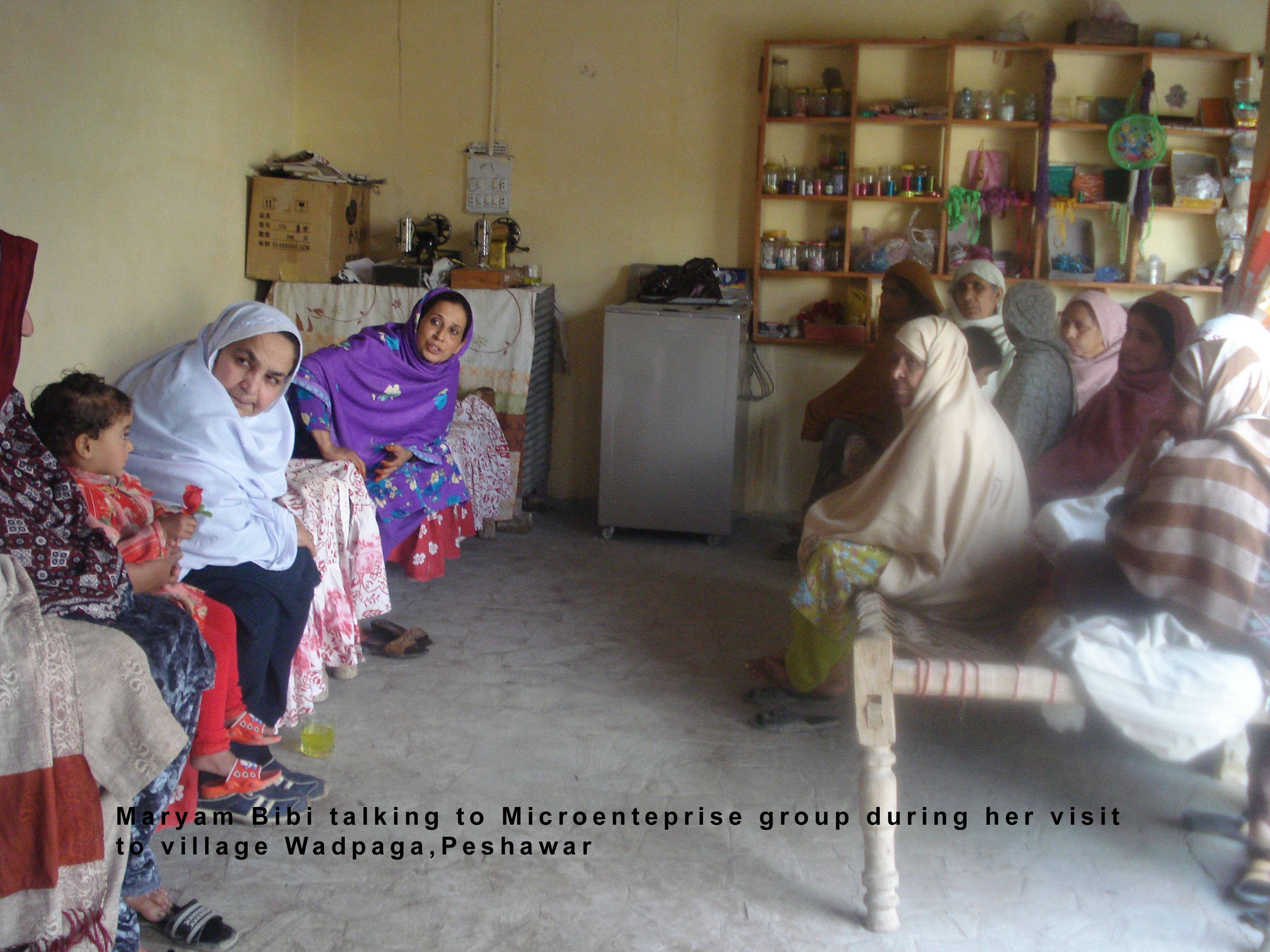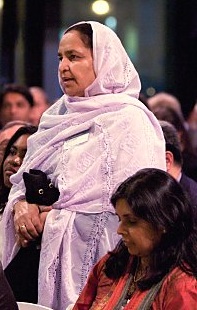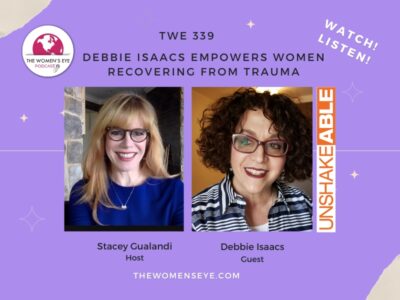By Farzana Ali, guest blogger in Peshawar, Pakistan
Website: hotfrontiers.com
I was just a student in 1996 when I heard about Maryam Bibi’s activities in the press. Her mission as founder of Khwendo Kor, meaning “Sisters’ Home” and the threats she was receiving were known throughout Pakistan. Most of her community centers for women were under attack and her colleagues under fire.
“The vast majority of tribal females are still deprived of the basic rights of education, health, and clean drinking water.”
After 9/11 when I was a working journalist, Maryam BiBi was considered on the side of the U.S. against Muslims during the war on terror. Then I had a chance to meet her, talk to her and watch her leading the womenfolk during the rule of the six religious parties-based alliance MMA.

This self-made woman from Waziristan had no family, society, government or community support in the beginning, but now the world supports her. She has an important story to tell, and I found myself the best listener and transmitter for this iron lady of the region…
EYE: Being a Tribal woman, tell me about your background…

MARYAM: My father was the first among his family, village and clan who got his daughters educated almost 6o years ago. He strongly identified himself with Islamic norms and tribal culture. My mother was illiterate and severely opposed her daughters’ education.
She thought that no one in the village would marry her daughters because with education girls become delicate and not able to perform the heavy work of fetching water from the streams, collecting fuel wood and grazing cattle, etc. She also was told by people in the village that educated girls are bad girls.
He was faced with a dilemma about whether he was right in his decision to educate us. This situation made me very conscious from the very beginning not to disappoint my parents who did not want to lose their identity but at the same time wanted to move forward.
“My mother told me she prayed all through her pregnancy for a son.”
EYE: How did your family receive your birth as a female?
MARYAM: I was born in a small village called Mali Khel in the Jani Khel area of Wazir tribal people in Frontier Region Bannu. Tribal people have deadly feuds which go through generations and not taking revenge is disgraceful for the honor of the whole clan.
Therefore to have male children is of utmost importance. Before my birth my parents had two daughters, and they were desparate for a male child due to family pressure as well. My mother told me she prayed all through her pregnancy for a son.
My birth was very disappointing for the whole village, and my grandmother and other elderly women were crying and already discussing a second wife for my father.
EYE: Were you always unwanted because you were a girl?
MARYAM: My mother was still complaining of severe pain immediately after I was born, but the women around her said she is acting to gain attention and why should we give her more attention when she hasn’t delivered a boy.
But after an hour or so my mother gave birth to my twin brother, and the whole village resounded with gun fires in jubilation. In all this excitement I was forgotten for a long time then someone said please look at the girl and see if she is ok.
This shows how the birth of a girl is received in a tribal society. I have been facing resistance throughout my personal and professional life.
“The literacy rate for females in my tribal area is as low as 3%…”
EYE: Why did you focus on female education for your life’s work?
MARYAM: Education is a basic human right. I believe that it is the key to all positive change at individual and societal levels. One thing that is observed between the developing countries is the difference in literacy rates and education standards. Almost all underdeveloped countries especially in the Muslim world lag far behind in education. They are, in fact, facing an educational crisis.
The literacy rate for females in my tribal area is as low as 3%, and their situation is disheartening from almost all aspects as they lack confidence and mobility. They are extremely poor and have very low self esteem, are totally dependent upon family men, live in very poor conditions and have a very low status.

EYE: Are you able to do what you do because you are educated?
MARYAM: I am one of them but very different. I am not dependent on my family and can talk to men confidently. I enjoy recognition at local, national and international levels due the work I do through our NGO. All this became possible only because I was educated.
Education helps in redressing child marriages and honor killings so common in the tribal areas. An educated society is relatively a peaceful society. It is a pity that despite all the benefits, our tribal and other sisters and daughters are still deprived of this basic right. Due to these factors we focus on female education in our work.
“In some places we faced severe resistance including from my own family.”
EYE: What was your personal experience while working in the Tribal area?
MARYAM: It was very mixed. In some places we faced severe resistance including from my own family. They were of the opinion that if I was personally attacked, kidnapped or had propaganda campaigns made against me because of our NGO’s work, then this could create an honor issue for our family and clan. The whole family together would not be in a position to restore the lost honor.
EYE: You have faced many hardships. Can you share some of them with us?
MARYAM: We were raised in a very traditional and conventional manner. For example, we would go to school but in strict purdah (veil) and then were not allowed to go anywhere except to family events accompanied by other family members.
In our tradition it is the family who makes the marriage decisions. Immediately after my BA graduation when I was married off by my family, I started facing severe difficulties in coping with an extremely hard situation.
Our family believed that marriage would improve the mental health condition of my husband who had an illness, and when it didn’t, it meant I was not a good wife.
EYE: Yet because of financial concerns, you had to find work.
MARYAM: In line with our traditions I was supposed to take good care of my in-laws and have children as well. Since my husband couldn’t continue with his job, we were totally dependent upon my in-laws, and with four children, that made the situation extremely hard for me especially when I faced financial problems due to the children growing.
I made several attempts to do some work from home as it was out of the question that they would allow me to work outside of the household. For example I bought a buffalo by borrowing money from my mother to sell milk in the neighborhood but failed due to lack of confidence and entrepreneurship skills.
Nevertheless, I continued with my efforts and eventually was not stopped from seeking a job outside the home. Ever since I have been trying hard so that family matters are not neglected, and I fulfill my responsibilities in the household and as a mother.
“Before starting our work in a community we explain that the inclusion of women is mandatory…”
EYE: You are the founder of the organization Khwendo Kor. What does that stand for?
MARYAM: Khwendo Kor is a Pashtu language word meaning home for sisters implying that women in our society themselves must take initiatives and make collaborative efforts for changing their own life.
I founded the organization in 1993. We believe that communities and women who know their own issues are able to devise strategies and solve the troubles they are faced with provided they can become part of the decision making at different levels.
We do not believe in imposing our mandate. Before starting our work in a community we explain that the inclusion of women is mandatory in our work and only after their free consent do we start our work in a village.

EYE: How does it operate?
MARYAM: Khwendo Kor begins by forming interest groups of women and men for different purposes. For example, we have mothers’ and fathers’ education committees for setting and supervising community-based girls’ and women’s educational facilities.
Similarly we put together women’s micro-enterprise groups, men’ s and women’s village-based organizations and traditional female birth attendants’ groups. We work in eight districts of Khyber Pakhtoonkhwa, six tribal areas in northern Pakistan.
We have been implementing various projects including female literacy, mother and child health, women’s entrepreneurship, and humanitarian work to help people displaced by the war on terror, floods, earthquake and policy advocacy. Khwendo Kor is an active member of various networks engaged in different peace campaigns.
“We are Muslims and truly believe that Islam has given equal rights to women…“
EYE: You are working for an NGO which is sometimes seen as having a foreign agenda.
MARYAM: All our staff belong to the areas we are working in so we are not foreigners. We are Muslims and truly believe that Islam has given equal rights to women such as the right to education, right to earn and own, right to inheritance, right to choice in marriage and to divorce.
We are also very sensitive to local conservative and patriarchal culture so are very careful in not to offend the local communities in any way. However, despite all the above, our experiences are very disheartening.
The tribal areas are among the among poorest in Pakistan with extremely low literacy where almost 70% people live below the poverty line. The terrain is mountainous and living conditions are harsh. On top of all this we are faced with conflicts such as the war on terror and the drone attacks which are made on a daily basis.

EYE: How stressful is it working under these conditions?
MARYAM: The security situation is precarious. Working for a women’s NGO is extremely difficult. People take us as US spies; elders think we are bad women; women think we’re doing things against tribal culture; Taliban attack us for doing things against Islam.
Therefore we invest a lot of time and energy in building trust with the people to achieve their support, and once this is accomplished, it’s only then with their support that we try to actively engage the women and girls.
“Explosives were put in our office; our staff has been kidnapped several times…“
EYE: How dangerous is your work?
MARYAM: For example, explosives were put in our office; our staff has been kidnapped several times; mosques were used to propagate against our work; our vehicles were attacked and character assassination took place using the newspapers.
Due to Talibanization these problems have been further intensified. The staff has received death threats. We have been managing and surviving all these difficulties with the help of the local communities and are expanding our support and relationship with them.
“Almost all areas where we work are dangerous…”
EYE: What was the most dangerous area where you worked?
MARYAM: Almost all areas we work are very dangerous. However, I think the most treacherous area we work in is still that of FR Bannu where the Wazir tribal people reside. It is a stronghold of almost all leading Taliban/militant leaders.
Here the drone attacks are taking place on daily basis and military operation and clashes with army also are common. Taliban and militants here have strong links with what happens in Afghanistan.
EYE: Do you think people are beginning to believe in you now?
MARYAM: I do think our work has been pioneering in changing the perception about NGOs. We are considered as an indigenous and a credible organization.
We are increasingly enjoying support of people even from the most conservative and remote tribal areas such as Waziristan though we are a women led organization and are known for women’s development and empowerment.

EYE: As a Tribal woman do you feel change has been for the better for the general female population?
MARYAM: Yes, very much. Parents who can afford it send their children including girls to schools in nearby cities for education. I have seen whole families moving to cities for the sake of their children’s education.
However, the vast majority of tribal females are still deprived of the basic rights of education, health, and clean drinking water. They are still killed in honor issues and die in child birth.
EYE: How successful do you think you have been?
MARYAM: Every day we receive requests from the villages in these areas to work there. We have also developed a good relationship with governmental and non-governmental institutions at all levels.
For example I am on many high level decision-making bodies and committees. We have received many national and international awards and recognition.
International donors including the UN support our work with the grass roots’ communities.
There is more awareness among people including women to analyze their own situation and look for opportunities to improve their lives.
EYE: Thanks to both Farzana and Maryam Bibi for giving us this insight into fighting for women’s rights in their country.
Farzana Ali has been interviewed on this website about her own extensive career in journalism working in this volatile region.





Leave a Reply